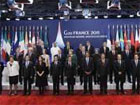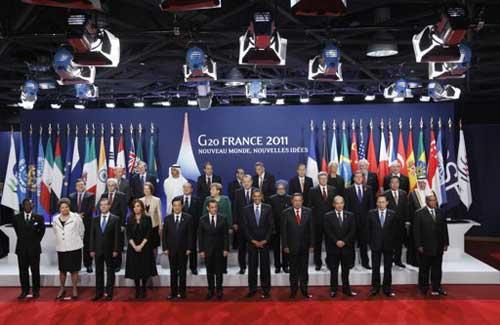| Videos | ? Latest |
|
? Feature | ? Sports | ? Your Videos |
G20 summit concludes, limited progress achieved

 0 Comment(s)
0 Comment(s) Print
Print E-mail
CNTV, November 5, 2011
E-mail
CNTV, November 5, 2011
The G20 summit is now over. The two-day meeting was overshadowed by the Greek crisis. While the Euro bailout plan seems to be back on track, no firm commitments were made and the final communique lacked in detail and specific numbers.
Everyone left the G20 summit Friday relieved that at least the Greek Prime Minister abandonned a last-minute plan to hold a national referendum on the Euro bailout plan. This could have held the world economy hostage for months to come.
Investors had been hoping G20 nations would lend the struggling eurozone a helping hand - but the message was clear: Europe first needs to help itself.
|
|
|
G20 leaders stand for a group photo at a G20 summit in Cannes, France. [CNTV] |
Barack Obama, US President, said, "Ultimately, the problems of Europe are going to be solved primarily by European leaders, in terms of instilling confidence in the markets that Europe still stands behind the euro and is committed to that process."
That disappointed markets.Stocks, bonds and the euro all fell, and Italy’s borrowing rates hit worrying new highs.
The most likely way for the eurozone to get additional financing is through a special account at the IMF, into which individual countries can make payments. But that has been put off at least until February.
Amid all the disappointment, some substantial efforts are being made. France, the host of the G20 summit, said on Friday that European countries will try to get a tax on financial transactions in place next year to help poorer nations.
Nicolas Sarkozy, French President, said, "We morally consider that it is indispensable that the people of the world know that the financial actors responsible for the current crisis will have to pay for the damages caused. That is the purpose of the tax on financial transactions."
"We don’t want anymore tax havens. The message is very clear. We don’t want them anymore. And the countries which remain tax havens, with banking concealment, will be put on the margins of the international community. "
But some analysts say it’s too little too late, as the eurozone debt crisis threatens to plunge the world economy into another recession.






